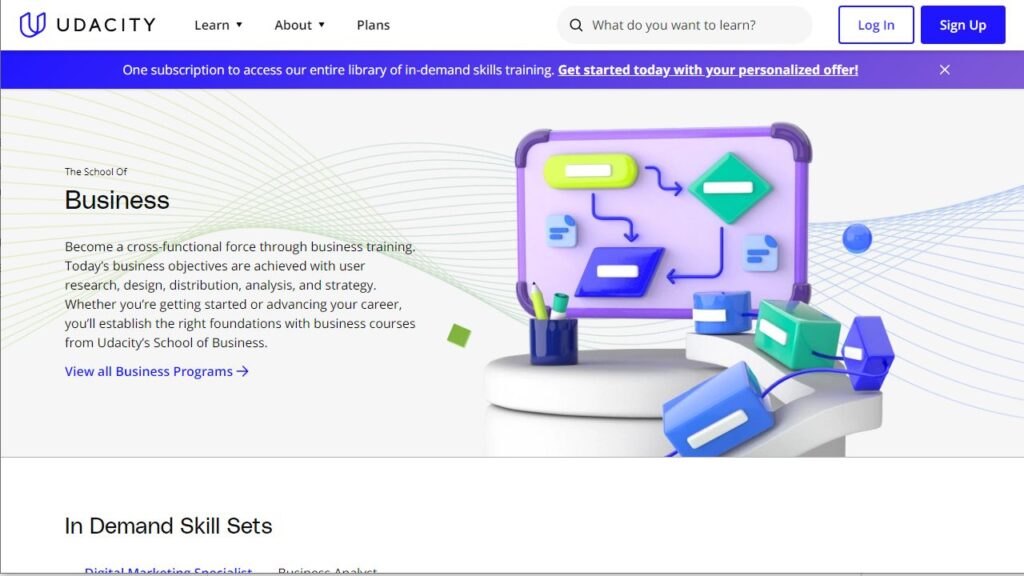Table of Contents
Some links on The Justifiable are affiliate links, meaning we may earn a small commission at no extra cost to you. Read full disclaimer.
Are you considering a Udacity Nanodegree to boost your career? This article explores how these programs can impact your professional journey.
Understanding Udacity Nanodegree Programs

Udacity Nanodegree programs offer unique, practical learning experiences for those seeking a career shift or skills upgrade. Designed for professionals, these programs emphasize hands-on projects to build real-world skills. But how transformative can a Udacity Nanodegree really be?
What Is a Udacity Nanodegree?
A Udacity Nanodegree is an online program that provides specialized training in tech and business fields. Unlike traditional degrees, Nanodegrees focus on relevant skills and project-based learning. This practical approach helps students directly apply new skills in their careers.
In each program, students work on real-world projects under industry expert guidance. These projects mirror tasks professionals handle, making the learning experience realistic and impactful. For anyone looking to quickly build skills, this hands-on approach is appealing.
I find that Nanodegrees suit those who want a concise, impactful learning experience. They’re shorter than typical degree programs, making them ideal for working professionals or busy learners.
When students complete a Nanodegree, they often have a portfolio of projects, showcasing their abilities to potential employers. These projects demonstrate capability in specific skills, helping graduates stand out in the job market.
Key Features of Udacity Nanodegree Programs
Udacity Nanodegree programs are known for their intensive, project-based learning. Each program is designed with real-world applications, allowing students to gain skills directly applicable to their careers. Courses also include support from mentors and industry professionals.
These programs include personalized feedback, ensuring that learners continuously improve their skills. Through mentor support, students receive guidance, making the learning experience more effective. I believe this level of feedback is crucial for real skill-building.
With Udacity, students access flexible learning paths, enabling them to learn at their own pace. This flexibility makes it easier for working professionals to balance studies with other commitments, enhancing the program’s accessibility.
Job-ready skills are a key focus, covering trending topics like AI, data science, and programming. This ensures learners gain expertise in high-demand areas, increasing their chances of career advancement or transition into tech fields.
Popular Udacity Nanodegree Courses
Several Udacity Nanodegree programs stand out for their popularity and impact. Courses in Artificial Intelligence, Data Science, and Full Stack Development attract many learners, offering sought-after skills that appeal to employers across industries.
The AI Nanodegree, for instance, provides a deep dive into machine learning and neural networks. This program helps students understand cutting-edge AI concepts, making it valuable for tech enthusiasts or those aiming for AI careers.
Data Science Nanodegree programs cover data analysis, machine learning, and data visualization. These skills are vital for industries reliant on data-driven decisions, offering career growth opportunities for data-oriented professionals.
Full Stack Development, another popular Nanodegree, equips learners with skills to build end-to-end web applications. It’s a powerful choice for anyone looking to enter web development, with practical experience building complete applications.
Evaluating the Career Impact of a Udacity Nanodegree
Many question the actual career benefits of a Udacity Nanodegree. While it’s not a traditional degree, a Udacity Nanodegree can greatly impact your career by enhancing specific skills and opening doors to new job roles, often at a faster pace.
Skill Development Through Udacity Nanodegree Programs
Udacity Nanodegree programs prioritize practical skill-building, which makes them highly appealing to career-focused individuals. By engaging in project-based tasks, students acquire skills they can apply directly in their careers, enhancing job readiness.
The focus on real-world skills means that learners are equipped to handle industry-standard tasks. This real-world approach gives graduates an advantage, especially when transitioning to tech or data-focused roles that require hands-on abilities.
Employers value candidates who bring practical expertise to the table. A Udacity Nanodegree emphasizes hands-on learning, which I believe strengthens a resume more than theoretical knowledge, especially in competitive job markets.
After completing a Nanodegree, graduates often feel confident in applying their new skills. This confidence, combined with a strong project portfolio, positions them as capable candidates ready to handle demanding roles.
Job Placement Rates for Udacity Nanodegree Graduates
Job placement rates for Udacity Nanodegree graduates vary depending on industry and skill level. However, Udacity partners with career-focused organizations, providing graduates with networking opportunities, career advice, and potential job placements.
Udacity also collaborates with top companies in tech and business sectors. This partnership network supports learners in accessing exclusive job opportunities, increasing their chances of landing relevant roles post-graduation.
Graduates benefit from Udacity’s career resources, including resume reviews, LinkedIn optimization, and interview prep. These resources are invaluable, as they help candidates market their skills effectively and stand out to recruiters.
I suggest leveraging Udacity’s career services to improve job placement chances. Active engagement with these resources can be a game-changer in achieving your career goals after completing a Nanodegree.
Salary Increases After Completing a Udacity Nanodegree
Salary improvements after a Udacity Nanodegree vary widely, though many graduates report increases, particularly in high-demand fields like AI, data science, and development. The specialized skills acquired are attractive to employers seeking highly capable talent.
Graduates often transition into roles with higher earning potential than their previous positions. For those in tech and data sectors, a Nanodegree can serve as a stepping stone to more advanced roles, potentially boosting overall earning power.
Industry-specific skills are highly valued, especially as businesses invest in data-driven and tech-enabled solutions. This demand for specialized skills often translates to competitive salaries, making a Udacity Nanodegree a valuable investment.
While it’s hard to generalize exact salary increases, the career shift made possible by these programs frequently leads to improved compensation. The value lies in enhanced skills, which in turn increase the likelihood of better-paying opportunities.
Comparing Udacity Nanodegree Programs to Traditional Education

Many wonder how Udacity Nanodegree programs measure up to traditional education paths. While they don’t replace formal degrees, these programs provide a quicker, more affordable option to gain skills that are immediately applicable in real-world jobs.
Cost-Benefit Analysis of Udacity Nanodegree Programs
A Udacity Nanodegree offers a cost-effective way to build valuable skills. Traditional degrees can be costly, both in time and money, whereas Nanodegrees offer a more affordable alternative, focusing solely on industry-relevant skills and hands-on learning.
For those weighing costs, a Nanodegree provides targeted learning without the financial burden of a university program. In my opinion, this is ideal for professionals wanting skill development without substantial debt.
Since Nanodegrees are shorter in duration, learners save time, accelerating their journey to job readiness. This efficient timeline allows them to apply new skills to job roles faster than with traditional education.
I recommend assessing your financial and career goals to decide if a Nanodegree aligns with your needs. The value lies in obtaining critical skills affordably, especially if a traditional degree isn’t feasible.
Time Investment Required for a Udacity Nanodegree
Udacity Nanodegrees typically require a few months of part-time study, making them manageable for working professionals. Compared to years of university education, Nanodegrees offer a streamlined path to gaining job-ready skills in a shorter timeframe.
The condensed timeline means students focus on essential skills, eliminating non-essential coursework. This approach appeals to those aiming to quickly transition or advance in tech and business roles.
The ability to learn part-time adds flexibility, ideal for those balancing work, personal life, or other responsibilities. This accessibility broadens the appeal of Nanodegrees, especially for self-driven learners.
In my view, the time commitment is reasonable given the career benefits, allowing learners to achieve more in less time without compromising on the depth of knowledge gained.
Flexibility and Accessibility of Udacity Nanodegree Programs
Udacity Nanodegree programs provide a flexible, accessible learning environment. Online access allows students from anywhere to engage in high-quality education without relocating or attending in-person classes.
The self-paced structure suits professionals with busy schedules, enabling them to learn at their own convenience. This accessibility broadens opportunities for learners globally, making quality education reachable to more people.
Udacity’s platform is designed for user-friendly navigation, ensuring a seamless learning experience. This ease of use is particularly helpful for those new to online learning or pursuing education after a break.
With these programs, learners have the flexibility to advance their careers without disrupting their current commitments.
Real-World Applications of Udacity Nanodegree Skills
Udacity Nanodegree skills provide immediate, practical value in the job market, empowering graduates to tackle complex, real-world tasks. These programs equip learners with hands-on knowledge that can directly influence their career success in various fields.
Success Stories of Udacity Nanodegree Graduates
Graduates of Udacity Nanodegree programs often experience significant career advancements. Their stories showcase the power of targeted skill-building, where real-world projects serve as proof of their abilities, often leading to high-impact job placements and promotions.
These success stories highlight how Udacity alumni transition into roles they might not have accessed otherwise. Many report breaking into competitive fields like data science or software engineering, equipped with relevant, job-ready skills gained from their Nanodegrees.
Employers appreciate candidates with hands-on experience, making these graduates highly desirable. Their Nanodegree projects act as a testament to their skills, validating their readiness to contribute effectively in real-world scenarios.
I recommend reviewing these stories if you’re unsure about a Nanodegree’s potential impact. They provide insight into the program’s effectiveness, offering relatable examples of how Udacity graduates achieve career milestones.
Industry Recognition of Udacity Nanodegree Credentials
Udacity Nanodegrees have gained recognition across industries, especially in tech sectors that prioritize practical expertise. Employers increasingly value these credentials as they reflect hands-on skills that align with current industry needs, making graduates stand out.
In fast-evolving industries, where new tools and technologies frequently emerge, Udacity’s programs adapt to these shifts. Their focus on high-demand skills ensures that learners gain relevant expertise, which is something many employers actively seek.
Hiring managers often prioritize candidates who demonstrate practical abilities over traditional academic achievements. A Nanodegree shows a commitment to learning industry-specific skills, which many businesses find beneficial for fast-tracking new hires.
I believe that industry recognition will only grow, as more employers see the tangible skills Udacity graduates bring to the table. This trend could enhance the value of these credentials, making them even more respected in competitive job markets.
Networking Opportunities Through Udacity Nanodegree Programs
Networking within Udacity Nanodegree programs creates a sense of community, connecting learners with peers and mentors. These connections often evolve into professional relationships, which can be instrumental in navigating career paths or finding job opportunities.
The peer network offers an opportunity to learn collaboratively, exchanging insights and experiences. I find that this shared learning environment can boost motivation and foster a supportive space, especially helpful for those new to the field.
Udacity also hosts events and forums where students can engage with industry experts. This exposure enhances professional networking, giving learners access to potential mentors or collaborators who might assist in future career endeavors.
The alumni network provides a continuous connection to other graduates, creating lasting relationships. Engaging with this community can be invaluable, whether you’re seeking advice, job leads, or simply shared experiences from fellow professionals.
Choosing the Right Udacity Nanodegree for Your Career Goals

Selecting the right Udacity Nanodegree is essential for achieving career objectives. Each program offers unique benefits tailored to different fields, so it’s important to align your choice with your specific professional aspirations and current skill set.
Assessing Your Current Skill Level Before Enrolling
Before enrolling, I suggest evaluating your existing skills to determine which program level best suits your needs. Some Nanodegrees cater to beginners, while others are advanced, providing specialized knowledge for professionals with prior experience.
Understanding your starting point helps you avoid frustration and ensures you’re challenged without feeling overwhelmed. This self-assessment can prevent choosing a program that’s too basic or too advanced, allowing you to maximize learning.
If you’re unsure of your level, Udacity offers skill assessments to guide your decision. Taking these assessments can clarify where you stand, enabling you to select a Nanodegree that aligns with your current expertise and growth goals.
In my opinion, taking the time for this assessment enhances the value of your learning journey. It ensures the course content directly benefits your development, providing skills that add immediate value to your career.
Aligning Udacity Nanodegree Programs with Industry Demands
To make the most of a Nanodegree, aligning your chosen program with industry needs is essential. Researching in-demand skills within your target field can help you select a course that maximizes employability and career growth.
Many Udacity programs focus on high-demand areas, like data science and web development. These fields consistently seek skilled professionals, making these courses a practical choice for those aiming to enter or advance in these sectors.
Before deciding, I suggest looking into job trends or speaking with industry professionals. Their insights can guide you toward a Nanodegree that offers competitive skills, enhancing your chances of landing desirable roles post-graduation.
Choosing a program aligned with your industry’s demand provides a clear return on investment. It ensures that the time and effort you invest yield skills that matter to employers, increasing your career prospects in a meaningful way.
Leveraging Udacity Nanodegree Projects in Your Portfolio
Projects completed during a Udacity Nanodegree can serve as valuable portfolio pieces. These projects demonstrate your technical skills, showcasing your ability to handle tasks relevant to your desired field, making them useful for impressing potential employers.
A well-curated portfolio highlights your specific abilities, often telling a more compelling story than a resume alone. Employers value these concrete examples, as they provide a clearer picture of your skills and readiness for job roles.
Your Nanodegree portfolio should include your best projects, emphasizing those that align with your career goals. Selecting relevant projects allows you to cater your portfolio to specific roles, helping you stand out in competitive job markets.
I recommend reviewing your portfolio periodically to keep it up-to-date. Regular updates ensure it reflects your current skills and any new competencies you acquire, increasing your appeal to recruiters and hiring managers.
Maximizing the Benefits of Your Udacity Nanodegree
Earning a Udacity Nanodegree opens up many opportunities, but to fully reap the benefits, it’s essential to actively engage with the available resources. Leveraging career services, continuing education, and alumni connections can significantly amplify your program’s impact.
Utilizing Udacity’s Career Services for Job Placement
Udacity offers career services designed to help graduates navigate the job market. These resources include resume reviews, interview preparation, and LinkedIn optimization, each aimed at improving job placement outcomes for graduates.
The resume review service is particularly useful, as it helps you showcase your Nanodegree skills effectively. I suggest taking advantage of this service to present your accomplishments in a way that resonates with employers.
Interview prep sessions are another great resource. Practicing with professionals familiar with industry standards can boost your confidence, helping you communicate your skills clearly during actual job interviews.
Utilizing these services positions you as a strong candidate in competitive fields. Engaging fully with Udacity’s career resources can be a game-changer, enhancing your ability to land meaningful job roles post-graduation.
Continuing Education After Your Udacity Nanodegree
Continuing education is crucial in fast-paced industries like tech. After completing a Udacity Nanodegree, staying updated on emerging trends and skills ensures your knowledge remains relevant and valuable to current and future employers.
Following your Nanodegree, exploring additional courses or certifications can complement your learning. I recommend selecting short courses or certifications that address gaps or enhance specific skills relevant to your career goals.
Staying engaged with industry news or trends also supports continuous learning. Reading articles, attending webinars, or joining professional groups keeps your knowledge fresh, allowing you to maintain a competitive edge.
In my view, ongoing education isn’t just about skill-building. It shows employers your commitment to personal and professional growth, an attitude highly valued in today’s job market.
Engaging with the Udacity Alumni Community
Connecting with the Udacity alumni community provides a supportive network of peers who’ve completed similar learning journeys. Alumni networks can be a great source of career advice, job leads, or collaborative opportunities.
Joining alumni groups fosters relationships with individuals in various industries. These connections often lead to valuable insights and experiences, offering support and motivation as you advance in your career.
Networking with alumni also helps you learn about different career paths taken by graduates. These stories offer inspiration, showing the diverse ways a Nanodegree can impact careers and broaden professional horizons.
If you’re looking for guidance, I suggest reaching out to alumni for advice. Many are open to sharing their experiences, making the alumni network an invaluable resource for mentorship and professional growth.
Potential Drawbacks of Udacity Nanodegree Programs

While Udacity Nanodegree programs offer valuable skills, they aren’t without limitations. Understanding these drawbacks can help you make an informed decision, ensuring the program aligns with your goals and expectations.
Limitations of Udacity Nanodegree Credentials
Udacity Nanodegree credentials are highly practical but may lack the same recognition as traditional degrees. While they showcase skills, they may not hold the same weight with employers who prioritize formal academic backgrounds, especially in more conservative industries.
Some employers may prefer candidates with degrees, viewing them as a broader educational foundation. If you’re entering fields that typically require formal qualifications, this perception could impact your career path despite your practical skills.
However, Nanodegree credentials are recognized in tech and digital roles, where hands-on skills often outweigh formal education. I suggest evaluating your industry’s preferences to gauge how much value your chosen field places on these credentials.
For those in tech-focused careers, a Udacity Nanodegree can be highly beneficial. It’s wise to balance the credentials with practical experience, as a portfolio of work can often counterbalance any perceived credential limitations.
Financial Considerations of Enrolling in a Udacity Nanodegree
Enrolling in a Udacity Nanodegree involves a financial commitment that can be challenging for some. While less expensive than a traditional degree, these programs still require an investment, which may be a drawback for budget-conscious learners.
Udacity often offers scholarships, which can offset some costs, but the overall price may still be a barrier. I recommend researching scholarship options and financial aid possibilities before committing to see if you can reduce expenses.
Weighing the cost against potential career benefits is important. For those seeking a quick skill boost, the investment may be worthwhile, especially if it leads to career growth or a salary increase. Think about your career goals and budget carefully.
I believe that viewing a Nanodegree as an investment can help determine its value. If the program aligns closely with your career objectives, the cost may feel justified. However, it’s always wise to compare options to ensure it’s the right choice.
Self-Motivation Required for Online Learning Success
Self-motivation plays a crucial role in succeeding with Udacity Nanodegree programs. Unlike traditional classrooms, online learning relies on personal discipline, which can be challenging for those who struggle with staying organized and motivated.
Setting a clear study schedule is vital for managing coursework effectively. I suggest creating weekly goals, as breaking the program into smaller tasks can make the workload more manageable and keep you on track.
Udacity offers support, but much of the progress depends on your initiative. For learners who thrive in structured environments, this may feel challenging, so consider whether self-paced learning suits your style.
I find that joining study groups or engaging with the Udacity community can provide motivation. Interaction with peers keeps you accountable and makes the learning journey less isolating, especially if self-discipline isn’t a strong suit.
Final Thoughts on Udacity Nanodegree Programs
Choosing a Udacity Nanodegree can open new career possibilities, but it’s essential to weigh the pros and cons carefully. These programs are valuable for hands-on skill development but come with specific considerations worth evaluating.
Weighing the Pros and Cons of a Udacity Nanodegree
Every Udacity Nanodegree offers both advantages and potential downsides. The hands-on projects, flexible structure, and industry relevance make these programs beneficial for many, yet they may lack the recognition of a traditional degree.
For tech-focused careers, the benefits may outweigh the cons. I suggest assessing your field to see if practical skills are prioritized. For some industries, a Nanodegree provides just the right skill set for career advancement.
If you need formal recognition, a Nanodegree might be limited. However, for skill-specific careers, these programs offer direct pathways to industry roles, making them a valuable investment in time and money.
Reflecting on your professional goals can clarify whether a Udacity Nanodegree fits. Balance the cost, time commitment, and career impact to determine if it’s the right option to help you reach your objectives.
Making an Informed Decision About Your Career Path
An informed decision involves evaluating how a Udacity Nanodegree aligns with your long-term goals. While these programs are practical, they may suit some career paths more than others, so consider both your immediate and future ambitions.
Think about the specific skills you want to develop. If your goal is to gain hands-on experience quickly, a Nanodegree may be ideal. However, if formal credentials are essential, this route might only partially meet your needs.
I advise looking into job postings or speaking with industry professionals to understand your field’s preferences. Their insights can provide valuable context, helping you decide if a Nanodegree enhances your career path effectively.
Ultimately, a clear vision of your career objectives can guide this decision. Aligning the program with what employers in your target field look for will help ensure you’re on the right path toward achieving professional growth.
Taking the Next Steps Toward Career Advancement
If you’ve decided to pursue a Udacity Nanodegree, the next steps involve maximizing your learning experience. Embrace each project as a valuable addition to your portfolio, and engage actively with Udacity’s career resources for optimal results.
Using the career services, like resume reviews and interview prep, can make a substantial difference in job placement. These tools help you market yourself effectively, highlighting the skills you’ve acquired through the Nanodegree.
I suggest staying connected with the Udacity community. Networking with peers and alumni can lead to job opportunities and mentorship, enriching your professional network and potentially opening doors to new roles.
Your journey doesn’t end with completing the program. Keep learning and updating your skills, as continuous growth can keep you relevant in competitive job markets. Embrace this as a first step toward ongoing professional advancement.
I’m Juxhin, the voice behind The Justifiable.
I’ve spent 6+ years building blogs, managing affiliate campaigns, and testing the messy world of online business. Here, I cut the fluff and share the strategies that actually move the needle — so you can build income that’s sustainable, not speculative.






